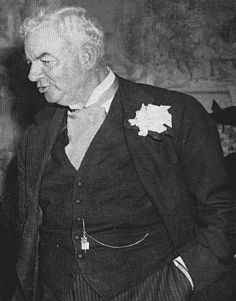Some Biogeographers, Evolutionists and Ecologists:
Chrono-Biographical Sketches
Barbour, Thomas (United States 1884-1946)
herpetology, natural history
 Photo courtesy of The Auk. |
Thomas Barbour is perhaps most remembered for his productive years as director of the Museum of Comparative Zoology, but his career also embraced travel and collecting, writing (nearly four hundred publications), and even some intelligence work in Cuba during World War I. A man of independent means, Barbour spent a good deal of time traveling all around the world, both as observer and collector. He had an especial affinity for the American tropics, however, and most of his writings, both technical and popular, concern this area. As a zoologist he is primarily known for his work on the taxonomy and natural history of reptiles and amphibians, but also made significant contributions to ornithology. Barbour's studies convinced him that the contemporary dispersalist theories of W. D. Matthew were inadequate; he instead favored explanations for inter-continental affinities based on the posed past existence of now-collapsed land bridges. |
Life Chronology
--born on Martha's Vineyard, Massachusetts, on 19
August 1884.
--1906: A.B. in zoology, Harvard University
--1907-1908: delegate to the first Pan-American
Scientific Congress, Santiago, Chile
--1908: A.M. in zoology, Harvard University
--1910: Ph.D., Harvard University
--1910-1925: associate curator, Museum of Comparative
Zoology, Harvard University
--1914: publishes "A
Contribution to the Zoögeography of the West Indies, with Especial
Reference to Amphibians and Reptiles" in the Memoirs of the Museum
of Comparative Zoölogy at Harvard College
--1917: publishes A
Check List of North American Amphibians and Reptiles, with Leonhard
Stejneger
--1922: named lecturer in zoology, Harvard University
(later made professor)
--1923-1945: executive officer, Barro Colorado
Island Laboratory, Gatun Lake, Panama
--1924-1927: president, Boston Society of Natural
History
--1925-1927: curator of herpetology, Museum
of Comparative Zoology
--1927-1946: director, Museum of Comparative
Zoology
--1927: named custodian of the Atkins Institution's
botanical garden at Soledád, Cuba
--1930: honorary Sc.D., Havana University
--1933: elected to the National Academy of Sciences
--1934, 1935: visits locations in Africa
--1935: honorary Sc.D., Dartmouth University
--1940: honorary Sc.D., Harvard University
--1940-1946: president, Boston Society of Natural
History
--1943: publishes his Naturalist
at Large
--1945: publishes his A Naturalist
in Cuba
--dies at Boston, Massachusetts, on 8 January
1946.
For Additional Information, See:
--Biographical Memoirs, National Academy of Sciences
(U.S.A.), Vol. 27 (1952).
--The
Auk, Vol. 65(3) (1948): 432-438.
--Herpetologica, Vol. 3(2) (1946): 33-39.
--Systematic Zoology, Vol. 13(4) (1964): 227-234.
--American National Biography, Vol.
2 (1999).
--Dictionary of American Biography,
Supplement Four (1974).
--American
Naturalist, Vol. 80(790) (1946): 214-216.
*
*
*
*
*
Copyright 2005 by Charles H. Smith. All rights
reserved.
http://people.wku.edu/charles.smith/chronob/BARB1884.htm
Return to Home/Alphabetical Listing by Name
Return to Listing by Country
Return to Listing by Discipline